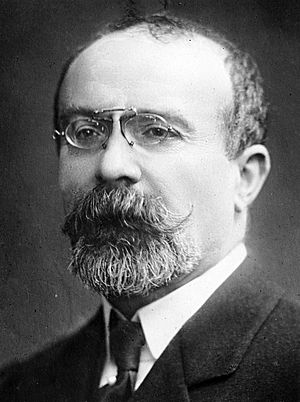Louis Barthou facts for kids
Quick facts for kids
Louis Barthou
|
|
|---|---|
 |
|
| Minister of Foreign Affairs | |
| In office 9 February 1934 – 9 October 1934 |
|
| Preceded by | Édouard Daladier |
| Succeeded by | Pierre Laval |
| In office 23 October 1917 – 16 November 1917 |
|
| Preceded by | Alexandre Ribot |
| Succeeded by | Stephen Pichon |
| Prime Minister of France | |
| In office 22 March 1913 – 9 December 1913 |
|
| Preceded by | Aristide Briand |
| Succeeded by | Gaston Doumergue |
| Personal details | |
| Born |
Jean Louis Barthou
25 August 1862 Oloron-Sainte-Marie, France |
| Died | 9 October 1934 (aged 72) Marseille, France |
| Cause of death | Assassination by gunshot |
| Political party | Democratic Republican Alliance |
| Signature |  |
Jean Louis Barthou (born August 25, 1862 – died October 9, 1934) was an important French politician. He served as the Prime Minister of France for about eight months in 1913. During his time as prime minister, a new law was passed in July 1913. This law helped families by giving them money if they had children.
Louis Barthou also worked as the Minister of Foreign Affairs (which is like the top diplomat) in 1917 and again in 1934.
Contents
Early Life of Louis Barthou
Louis Barthou was born on August 25, 1862. His hometown was Oloron-Sainte-Marie in France.
Louis Barthou's Political Career
Barthou started his career as a deputy. This meant he represented his local area in the French parliament. He was also an expert on the history and laws of trade-unions, which are groups that protect workers' rights.
He became the Prime Minister of France on March 22, 1913, and served until December 9, 1913. As prime minister, he helped pass a law in June 1913. This law was important because it protected women workers before and after they gave birth.
Barthou held many other important government jobs, serving as a minister 13 different times. He was the Foreign Minister in 1917 and again in 1934. He played a key role in setting up the Franco-Soviet Treaty of Mutual Assistance in 1935. This was an agreement between France and the Soviet Union to help each other if attacked. However, his successor, Pierre Laval, officially signed it.
After World War I, Barthou was seen as a national hero. He was also a well-known writer. Because of his achievements, he was chosen to join the Académie française. This is a very respected group that protects the French language and arts.
In 1934, Barthou tried to create an "Eastern Pact." This was a plan to get several countries, including the Soviet Union, Poland, Czechoslovakia, and the Baltic states, to agree to protect each other's borders. He successfully helped the Soviet Union join the League of Nations in September 1934. The League of Nations was an international group that aimed to prevent wars. When Nazi Germany left the League in 1933, Barthou started a plan to make France's military stronger, especially its Navy and Air Force.
Louis Barthou: A Supporter of the Arts
Louis Barthou loved the arts. When he was in power, he worked with artists and cultural leaders. He believed that France's strong leadership in the arts made Paris a popular place for tourists and art collectors. He felt this also made France more respected around the world for its beauty and truth. Because of his support, people in the arts community called him the "minister of poets."
The Tragic Death of Louis Barthou
As Foreign Minister, Barthou met King Alexander I of Yugoslavia in October 1934. King Alexander was visiting Marseille, France. On October 9, 1934, a terrible event happened. King Alexander was assassinated by a terrorist named Velicko Kerin. Kerin was a far-right nationalist from Bulgaria.
During the attack, a bullet also hit Barthou in the arm. It went through his arm and cut a major blood vessel. He died from losing too much blood less than an hour later. The assassination had been planned in Rome by Ante Pavelić, the leader of a Croatian group called the Ustaše.
Later, a report on the bullets found at the scene was made in 1935. The results were kept secret for many years, until 1974. The report showed that Barthou was hit by a type of bullet commonly used by French police. This meant that Barthou was likely killed by a stray bullet during the chaotic police response, not directly by the assassin.
Louis Barthou's Legacy
The deaths of Barthou and King Alexander led to an important international agreement. This was the Convention for the Prevention and Punishment of Terrorism. It was created by the League of Nations in Geneva on November 16, 1937. While 25 nations signed it, only India officially approved it. Louis Barthou was given a state funeral four days after he died.
Images for kids
-
Barthou (right) with Polish marshal Józef Piłsudski in 1934
See also
 In Spanish: Louis Barthou para niños
In Spanish: Louis Barthou para niños
 | Ernest Everett Just |
 | Mary Jackson |
 | Emmett Chappelle |
 | Marie Maynard Daly |


